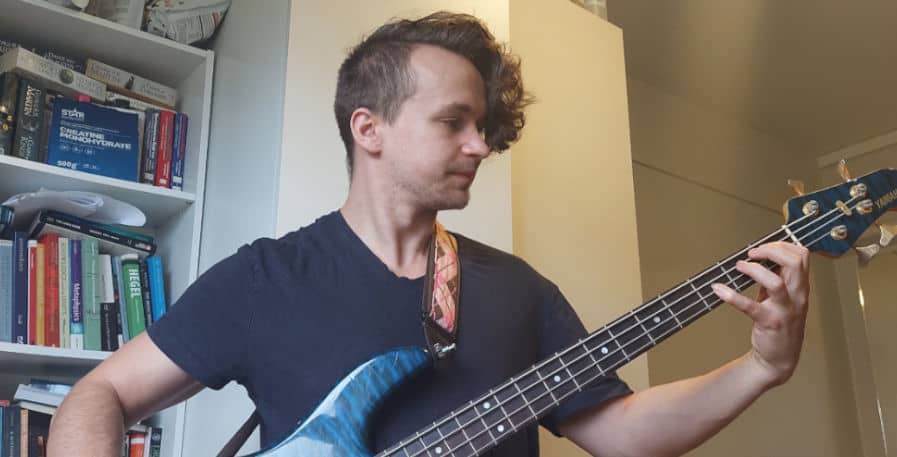While mileage will vary, there are some common trends in how quickly people are able to learn the bass guitar.
Therefore, as long as you go about learning the instrument the right way, it is possible to give a range of how long it will take you as well. This holds true whether you are looking to play the bass at a basic, intermediate, or professional level.
For this reason, I made this article to help you figure out how long it will take you to learn the bass guitar. I will show you what the different stages of playing the bass are, and when you can expect to reach them. I`ll also go into detail about how you can speed up your progress, and how mistakes can slow it down.
Lastly, I`ve added a section about my own experience with learning the bass. This will give you an idea of what the journey to becoming a bass player can look like. It will also show you what to do and what not to do if you want to learn the bass as fast as possible.
How long will it take you to learn the bass guitar?
Learning to play the bass at a beginner level generally takes approximately 6 months. With consistent practice, bassists tend to reach an intermediate level after 1-2 years. Becoming an advanced or professional bassist tends to take at least 3-4 years, and will take significantly longer for most people.
What genre you play, previous musical experience and your bass practice routine all impact how quickly you can expect to learn to play the bass.
There are also different stages of learning the instrument. It will take most people less than a month to be able to play simple 8th note grooves at an adequate level. However, playing at a professional level takes years of practice, and is not something that can be reached without consistency, effort, and experience.
Thus, before we dive into the 4 main factors that can speed up or slow down your progress, I`ve made this infographic. It details the different levels of playing bass, what they entail, and approximately how long it will take you to reach them.
Bear in mind that this timeline assumes that you practice correct and consistently, and is thus a best-case scenario. Thus, many bassists will spend longer (like I did), on reaching the different levels.
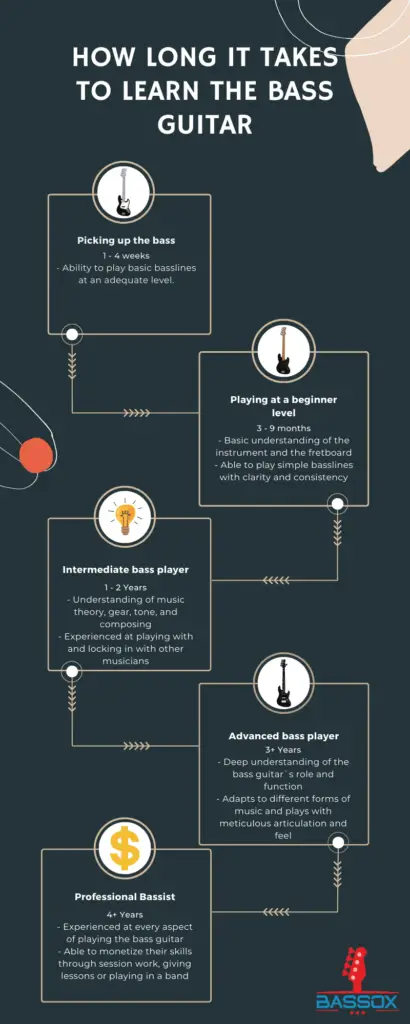
1. Genre
What genre of music you play makes a big difference in how long it will take before you can play the bass at an adequate level. This is because basslines differ greatly between different forms of music and different styles require different skill sets.
Therefore, I made a table of genres that showcases whether it’s time-consuming or not to learn the bass. Mileage will vary, as all genres can be played in different ways, but this will give you a general overview of what you are signing up for.
| Genre: | Time required to learn the basics: | Required main skills: |
| Rock | Fast-Medium | Locking in with the drummer and sounding tight |
| Metal | Medium | Playing fast and setting your tone correctly. |
| Pop | Medium | Adapting playstyle and tone to the song |
| Jazz | Long | Theoretical knowledge, articulation, feel, staying in the pocket |
| Hip-Hop | Medium | Adapting tone and articulation to the song |
| Punk | Fast | Sounding tight while playing fast |
| Classical | Long | Theoretical knowledge and playing with feel |
| Funk | Long | Grooving, slapping, and popping |
| Indie and alternative rock | Fast-Medium | Finding a fitting tone and writing fitting basslines |
| Disco | Medium | Grooving and articulation |
| Soul | Medium-Long | Playing with feel and articulation |
2. Practice Schedule
It goes without saying that how much you practice will impact how long it will take you to learn the bass.
What`s almost as important though, is how you schedule your practice time.
It is a best practice to avoid long and infrequent practice sessions. At the same time, you want to put in enough time for the session to be productive once you sit down to practice.
Thus, ideally, you`ll want to practice for at least 30 minutes at a time. As long as my fingers don`t start to feel burnt out, I find that practicing for 1-2 hours at a time works best for me.
However, when starting out, I didn`t have the stamina to play for that long. This is normal, and if you feel fatigued or in pain, do not continue practicing. This will not only lead to sub-optimal practice but also greatly increases the chance of developing wrist pains from playing the bass.
Furthermore, it`s preferable to spread practice sessions out over multiple days. For example, you will see faster results with 1 hour of practice every day of the week, than with three 1 hour sessions on Monday, and four 1 hour sessions on Wednesday.
There are many studies that stress the importance of taking breaks to maximize the effectiveness of learning to play music. Thus, practicing frequently for moderate amounts of time is generally the fastest and healthiest way of learning to play the bass.
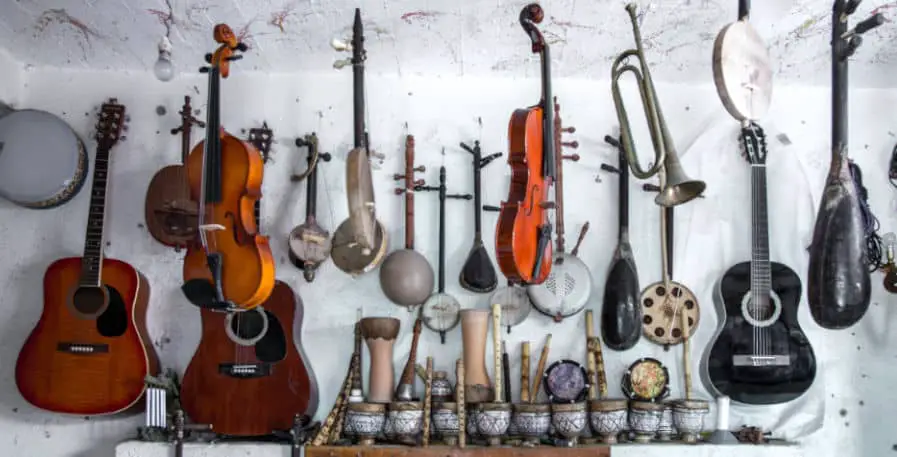
3. Previous Experience
Picking up your second instrument will be easier than picking up your first one. This is because, in order to play any instrument well, you also need to develop a general understanding of music as a whole.
While playing the bass is different than playing the piano, a lot of what you learn about either instrument can be used to learn the other.
As I had played the keyboard before I got my first bass, this sped up my initial progress.
Because of this, it was easier to locate the root note of chords and understand what notes worked and didn`t work for a bass line. It also became easier to memorize the fretboard, as I could compare it to the keys on a piano in my head.
Thus, previous musical experience can greatly speed up how quickly you are able to learn the bass guitar.
4. Method
Most importantly, how you practice the bass can be the difference between learning the instrument in 3 months, or never developing a proper technique.
Here are some of the things that I would recommend beginners to focus on:
- Finger exercises and drills
- Control, fluidity, and position of both hands
- Memorizing where every note on the fretboard is
- Gradually building up speed
- Practice keeping unplayed strings muted
And here are some tempting, but less productive ways to learn the bass that I would advise against:
- Trying to play difficult grooves to push your limits
- Developing speed by trying to play as fast as possible
- Putting too much emphasis on playing the right notes, and none on how you play them
- Relying solely on tabs and not developing a feel for where notes are on the fretboard
- Pushing through hand pains in order to practice for longer
Also, having a tutor can also speed up the rate at which you learn the bass guitar. This is because tutors can help you plan out how to practice and find bass exercises that suit your goals.
They will also be able to help you iron out weaknesses in your technique so that you won`t have to fix them on your own later on. Thus, while they are not a necessity, bass lessons tend to be worth it for anyone who is taking the instrument seriously.
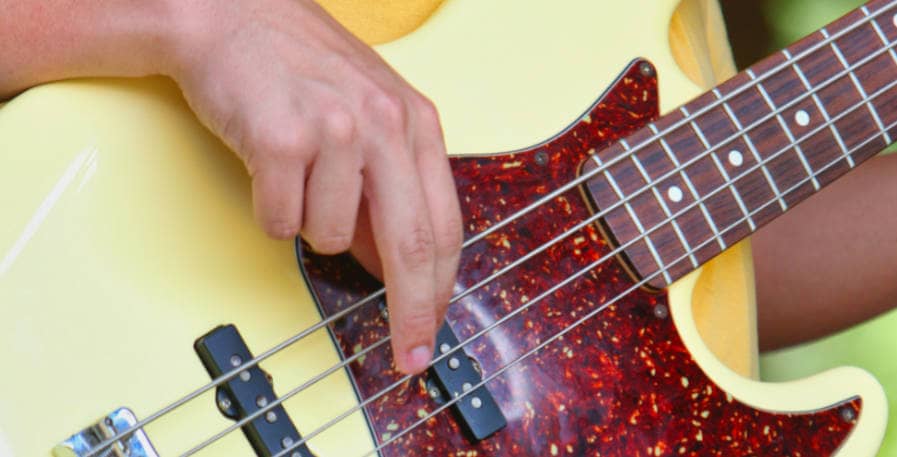
Is it easy to learn the bass?
Compared to most other instruments the bass guitar is easy to pick up and play at a beginner level. Becoming proficient at the instrument is however both difficult and time-consuming due to the range of skills, and the experience required to do so.
I`ve written an in-depth article about how hard it is to play the bass guitar. One of the key points I made in it, is that it is easy to play the bass, but it is hard to play the bass well.
As explained above, a good bassist needs lots of band experience in order to glue a band together. They also need to master a range of skills relating to technique, speed, tone, composing, grooving, and adapting.
At the same time, it does not take long before anyone can play simple basslines to a certain degree. Thus, while difficult to master, the bass is a very beginner-friendly instrument.
For this reason, it is important to have a clear idea of what we mean by “learning the bass”. Are you looking to cover your favorite artists, start a band, or make a living from playing the instrument?
Depending on your answer, it could take anywhere from a couple of months, to half a decade to learn the bass. Therefore, be aware that the instrument will become progressively more challenging, and that every level of playing the bass will be harder to reach than the last.
How long you should practice bass each day
How long you should practice bass daily comes down to what your musical goals are.
At a bare minimum though, I recommend practicing for at least half an hour, at least every other day.
This way, you will see continual growth as long as you practice methodically and remain consistent. However, if you are looking to become good at the bass as fast as possible, I recommend 1 long practice session 6 days a week.
For those looking to become intermediate at playing the bass as fast as possible, 1-2 hours is a good range. While ideally, you`d want the session to be longer, playing this long every day can cause burnout and wear out your fingers.
Thus, if you can push your practice sessions to 2 hours, great, but it is best to avoid it if it starts to feel painful or tedious.
If you have ambitions of becoming a professional bassist, I still recommend one session 6 hours a week. However, you should aim to make this session longer, and at least in the 2-3 hours range. You`ll also want to focus on developing your technique and finger stamina in order to keep the sessions this long.
As you develop good control over your technique, you can also push these sessions past the 3-hour mark. If you are ambitious about learning the bass but feel mentally burnt out after an hour or two of playing, you can also opt for 2 shorter daily sessions instead.
Can you teach yourself to play bass?
Teaching yourself to play the bass is common and perfectly possible. If you do not have a tutor to guide you along the way, it is crucial that you pick the correct learning materials to maximize the effectiveness of your practice.
I taught myself how to play the bass. While in hindsight I would most likely have done better with lessons, I managed to become decent at the instrument after a couple of years.
So if you don`t want to spend money on lessons or a course, you can teach yourself to play the bass for free.
If you do that though, I advise against sitting down with the instrument and figuring it all out on your own. You will severely hinder your growth without any guidance, and I highly recommend using free resources to at least point you in the right direction.
Thus, I recommend using at least one of the two following resources as a starting point:
- Talkingbass – Talkingbass has a range of free lessons on the core aspects of playing the bass. The content is very beginner friendly and consists of videos with clear demonstrations.
- Studybass – Studybass consists of written content that focuses a tad more on music theory than Talkingbass. This is a great resource if you prefer written content over videos, and want to learn or have knowledge of music theory.
Also, If you happen to play metal, I have written a full free guide on how to become a metal bassist. It includes scales and finger exercises that are helpful for beginners.
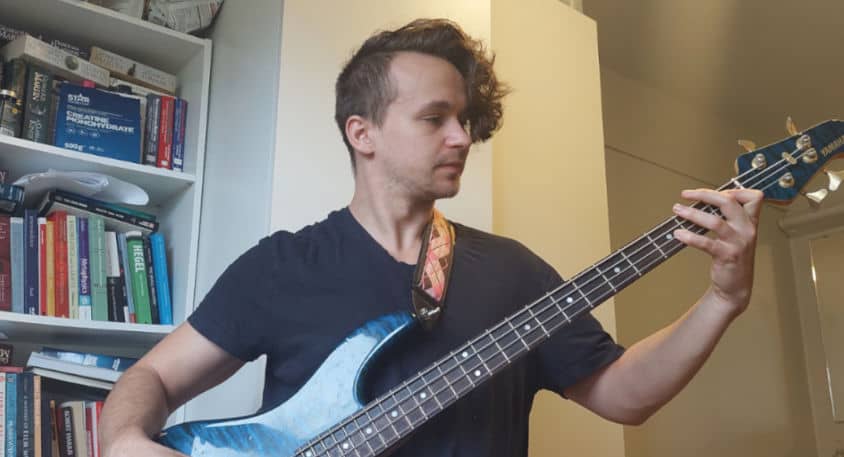
How long it took me to learn the bass guitar
To get a better idea of what learning the bass guitar looks like, I`m going to share my own story with you.
While it is an unconventional one, I think it highlights what`s important when learning the instrument. There are 3 main parts to the story that showcases how regular practice alone won`t be enough, and how to ultimately become an advanced bass player.
1. Picking up the bass guitar
When I got my first bass 15 years ago, I did some things the right way. For each thing I did right though, I did 3 things wrong.
What I did correctly, was that I practiced a lot and I was consistent in my practice. As I was interested in playing fast and melodic grooves my main focus was to develop speed. As a result, I was able to play fast grooves such as Muse`s Hysteria and Lamb Of God`s Laid To Rest in 2-3 months.
Or so I thought.
While I had built up decent plucking speed, my technique was horrible. What`s worse is that it took me another couple of months to notice what I was doing wrong. Namely, I didn`t always keep unplayed strings muted, my timing was inconsistent, and my fretting style was awkward.
Then, I had to go back and work on the basics. Fixing my technique after I had developed mistakes in my muscle memory took me several extra months. Thus, by the time I was able to play the bass properly, I had played for almost 1 year.
I had practiced daily for the entirety of the year, though a bit less while fixing my technique, as it was incredibly tedious to do so. Nonetheless, it was the consistent practice combined with learning the basics and focusing on my technique (albeit a bit too late) that made me able to reach this point.
2. Joining a band
After a year or so of picking up the bass guitar, I joined my first band. It was a 4-piece melodic death metal band with some friend of mine from school.
It didn`t take long before I realized that this was completely different from practicing in my room. While few of us had any band experience, I found it weird that we sounded so bad despite us all being decent at our instruments.
This is when I started to learn about the importance of tone, amp settings, EQ, playing in the pocket, locking in with the drummer, and connecting the band.
If that sounds like a lot to take in, that`s because it is.
It took a lot of trial and error before I started to really understand what my role as a bass player was. I`d say, by the time I got a decent grip on it, I had played for about 3 years and in 4 different bands.
This is a big reason the bass is easy to pick up but hard to master. Band experience is also a big reason that no matter how hard you practice, it is practically impossible to become proficient at the bass in a short amount of time.
Thus, I think it`s fair to say that even the most gifted of bassists will spend at least 6 months becoming decent at these skills. As for mastering them, I still haven`t. Adapting to and learning to play with other people is a lifelong gig and a skill that I will continue to develop for as long as I play the bass.
3. Lessons and Education
When I first took bass lessons, I had played the instrument for about 7 years. Up to this point, I was self-taught with a little help from the internet. I had to take the lessons as part of my Musicology degree, and initially, I was skeptical.
However, the year I took lessons I improved faster at the bass than I ever had before.
My teacher was mainly a double bass player and was a trained jazz musician. As I had mainly played rock and metal up to this point, he taught me so many things I had never even considered.
In terms of music theory, he showed me how I could voice my chords and create bass fills. He also showed me how to smoothly transition between chords in a way that could be applied outside of jazz.
In terms of technique, he made me notice flaws in my playing I wasn`t even aware of 7 years in. He showed me how to conserve energy in my fretting hand and how to position my fingers for upcoming notes. He also showed me how to build stamina in my plucking hand, while still retaining my aggressive plucking style.
If I had taken his lessons 6 years earlier, I`m sure I would be a significantly better bassist today. Thus, my experience with lessons is that they will speed up your progress significantly. Furthermore, it is best to take them as early on as possible, but it is also never too late to take them.
Conclusion
Every bass player’s journey is different.
At the same time, all of our journeys share some similarities.
Combine this with the bass requiering band experience to play well, and we can get a general range for how long the bass takes to learn.
As a little bonus tip, I recommend keeping a practice journal. This is because tracking your progress after each practice session makes it easier to notice your improvement and stay motivated. It is also helpful for identifying what you need to work more on and avoiding stagnation.
I generally track how long I practiced, what I practiced, and any improvements from last time. Improvements can be related to fretting or plucking speed, muting, control, articulation, or whatever else I`m currently trying to improve at.
Journaling is especially helpful for those among us who care deeply about our improvement as bassists. If you read this whole article, I think it`s safe to say that you and I both fall into that category.
With that, I hope this article was helpful for getting an overview of how long it will take to learn the bass, and I wish you the best in learning this amazing instrument.

